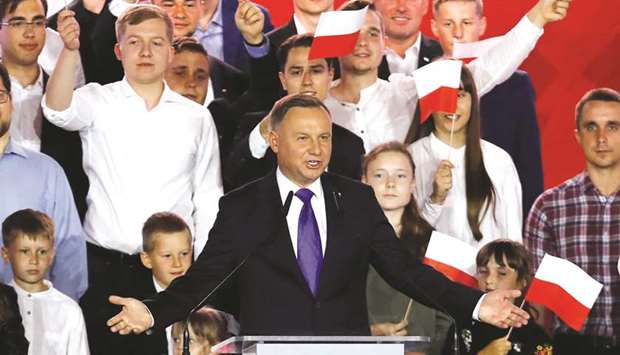Polish President Andrzej Duda has won five more years in power on a socially conservative, religious platform in a closely fought election that makes renewed confrontation with the European Commission likely.
Nearly final results from Sunday’s presidential election runoff showed Duda, 48, on over 51%, giving him an unassailable lead over liberal Warsaw mayor Rafal Trzaskowski, who won almost 49% of the votes, the National Election Commission said.
Duda is allied with the ruling nationalist Law and Justice (PiS) party, and his victory reinforces the government’s mandate to pursue reforms of the judiciary and media which the European Commission, the European Union executive, says subvert democratic standards. Duda has largely backed the PiS policies.
“To a large extent, the policy of Brussels, or rather Berlin, had focused on supporting the opposition,” Arkadiusz Mularczyk, a PiS lawmaker, told Reuters. “Polish society is not accepting this.”
Duda ran an acrimonious campaign in an election that was held despite the pandemic and was laced with homophobic language, attacks on private media and accusations that Trzaskowski serve foreign interests instead of Poland’s.
Trzaskowski, who had said he would repair Poland’s relations with Europe and use the presidential veto to block any legislation that would subvert democratic norms, dismissed the accusations.
PiS and the EU have been divided on climate change and migration, in addition to democratic norms.
Rifts are likely to be evident this week when EU leaders discuss the bloc’s long-term budget, with Brussels facing growing calls for funding to be made conditional on respect for the rule of law.
“EU institutions and the broader international community must now be vigilant to ensure...minority rights in Poland are upheld in the coming years,” said Dacian Ciolos, former prime minister of Romania and president of the Renew Europe Group in the European Parliament.
Brussels did not immediately comment on the election outcome.
One EU country swiftly welcomed Duda’s re-election — Hungary, which is also among anti-liberal voices in central Europe.
“The international liberal mainstream once again tried everything but the central European right-wing is up 3:0,” Hungarian Foreign Minister Peter Szijjarto said on Facebook, referring to recent conservative triumphs in Croatia, which is an EU member state, and Serbia, which is not in the EU.
Trzaskowski had said that, if elected, he would seek a more tolerant Poland and abolish state news channel TVP Info, which critics say gave overt support to Duda in its programming.
“The public broadcaster was used as a campaign tool for the incumbent,” said Thomas Boserup, Head of the Office for Democratic Institutions and Human Rights (ODIHR) special election assessment mission. “This is the clearest misuse of public resources we have seen in this election.”
Duda painted himself as a guardian of generous PiS welfare programmes that have transformed life for many poorer Poles.
Justice Minister Zbigniew Ziobro had suggested on Sunday night that PiS could push on quickly with its conservative agenda, and with its ambition to spur change in private media ownership towards outlets more favourable to its ambitions.

Polish President and presidential candidate of the Law and Justice (PiS) party Andrzej Duda speaks to supporters in Pultusk on Sunday night.
